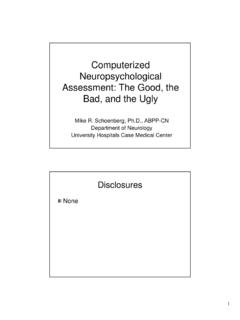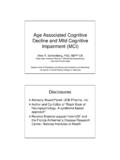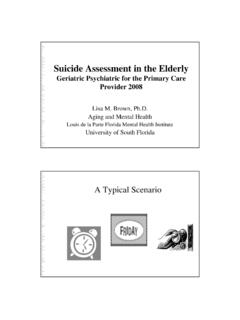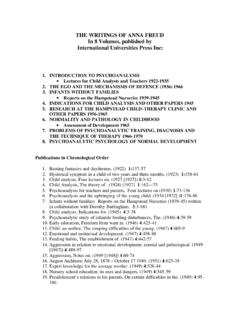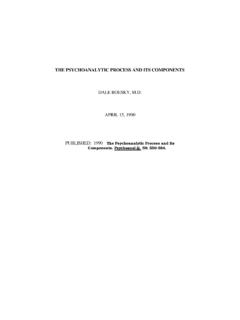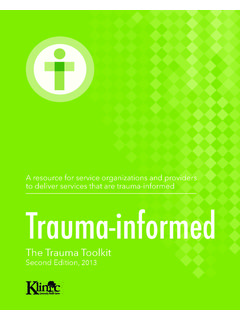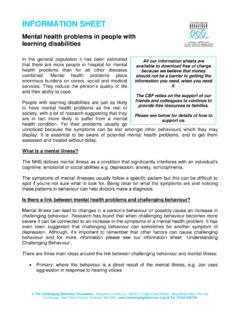Transcription of Crisis Intervention After Major Disasters
1 1 Crisis Intervention After Major Disasters By Daniel Benveniste, In this article the author presents a brief description of acute stress disorders and describes some early Intervention strategies for working with traumatized adults and children in the immediate aftermath of a Major disaster . It was written in response to the December 1999 floods that devastated much of Venezuela, killed 50,000 people and left 500,000 homeless and psychologically traumatized. The content of the article was originally presented in a lecture format for professionals and lay people who went out to work with the survivors in the shelters.
2 It was then written in English, translated into Spanish, distributed to counselors in the shelters in Caracas, and sent out on the Internet to mental health professionals across the country. Though it was written for mental health professionals working with victims of the Venezuelan floods, it will hopefully be useful to other mental health professionals, in the future, working with survivors of a wide range of Major Disasters . WHAT IS A PSYCHOLOGICAL Crisis ? A psychological Crisis comes about when a traumatic event overloads a person s capacity to cope in his or her usual fashion.
3 Psychological crises cannot reliably be predicted based on the events that precede them. An event that precipitates a psychological Crisis for one person is not necessarily going to precipitate a Crisis for another person. Nonetheless, some events commonly precipitate psychological Crisis reactions. These include physical assaults, torture, rape, automobile accidents, intense personal losses, and natural catastrophes such as earthquake, fire and flood. Events like these will often induce a psychiatric disorder that we call an ACUTE stress DISORDER.
4 The Acute stress Disorder is characterized by feelings of intense fear, helplessness and horror. There may also be an emotional numbing, a lack of emotional responsiveness, a feeling of detachment, reduced awareness of surroundings, a sense of unreality or amnesia. People suffering an Acute stress Disorder may feel anxious, excitable, agitated, distressed, despairing, irritable, or hopeless. They may re-experience the event in recurring dreams, flashbacks, or persistent memories of the trauma.
5 The person may avoid people, places and objects that may re-awaken memories of the traumatic event. They may have difficulty concentrating and may have difficulty functioning in their usual way at home and at work. They may also suffer survivor guilt or guilt for not providing enough help to others. Some people may become aggressive or self destructive, disregard self-care, become confused or behave in a bizarre fashion. When dealt with quickly, the symptoms of Acute stress Disorder will typically diminish or disappear entirely within 30 days.
6 In some cases, particularly when untreated, Acute stress Disorder may persist. If its duration is from one to three months we call it an ACUTE POSTTRAUMATIC stress DISORDER. When the symptoms last more than three months, we call it a CHRONIC POSTTRAUMATIC stress DIORDER. (The above diagnostic information is derived from the DSM-IV, 1994) It is not uncommon for untreated Posttraumatic stress Disorder symptoms to persist for many years and become serious constraints on a person s life. It is also important to remember that when a person struggles with a severe stress reaction, it is likely that the family or any other people around the patient will also be affected by the symptoms of the patient s Post Traumatic stress Disorder.
7 WORKING WITH ACUTE AND POST TRAUMATIC stress DISORDERED PATIENTS Counselors working with Acute and Posttraumatic stress Disordered patients may assist them in the management of the post-traumatic event tasks (informing others, making calls, rescheduling the person s daily routine), and providing a safe place to talk about either the event, the person s symptoms, or whatever else is foremost on the patient s mind. Though it is sometimes initially painful to talk about the traumatic event, people often report a sense of relief and a reduction of symptoms After they have been able to talk about the event.
8 They can see the situation more clearly After putting the pieces of the problem out on the 2 table and looking at them all, together with a counselor. While adults may talk with a therapist, a child suffering an acute stress reaction is likely to talk about it in the child s non-verbal language of play as well as in the verbally spoken metaphors of the stories they tell from their imagination. So with children, we are more likely to conduct a play therapy session (more about this later). In many circumstances, as mentioned above, the sudden behavior change of the traumatized person affects the whole family.
9 When this happens it is often helpful for the whole family to meet with a therapist who can help them address the difficult issues and improve communication between family members. A traumatic event is one in which a person s coping mechanisms are overwhelmed by the intensity of the situation. In treating Acute stress Disorder and Post Traumatic stress Disorder we want to recover the event, break it down into smaller pieces, understand it, master it, digest it and make it all more intelligible. There are, however, some circumstances in which the person is uninterested or unable to speak of the specific traumatic event.
10 In these circumstances the person is encouraged to speak about whatever is uppermost in his or her mind and their symptoms sometimes diminish nonetheless. COUNSELORS WORKING WITH VICTIMS OF NATURAL Disasters In natural Disasters such as earthquakes, catastrophic fires and floods it is important for counselors to remember that everyone is affected by the Crisis , including the counselors themselves. As such, there are several useful principles to keep in mind: 1) COUNSELORS NEED TO TAKE CARE OF THEMSELVES AND EACH OTHER PHYSICALLY AND EMOTIONALLY.
